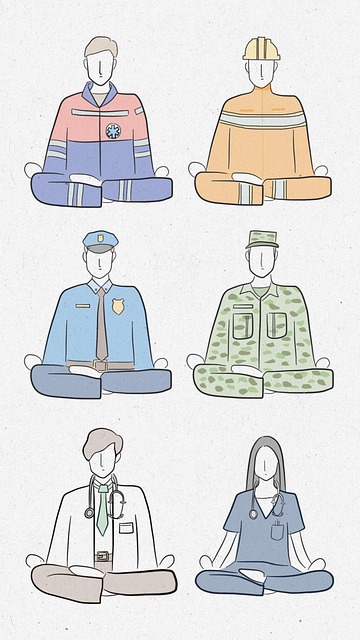Denver Cognitive Behavioral Therapy (CBT) stands out for integrating social skills training into mental health support, addressing conditions like anxiety and depression linked to social interaction struggles. Using Mind Over Matter principles, CBT teaches personalized communication strategies, cultivates self-compassion, and enhances emotional intelligence through role-playing and community engagement. This holistic approach empowers individuals to thrive socially while improving their overall mental health outcomes.
Social skills training is a powerful tool in managing mental health conditions, addressing a critical aspect often overlooked in traditional therapy. This article explores the intricate relationship between social interactions and mental well-being, focusing on Denver Cognitive Behavioral Therapy (DCBT) as an effective approach. We’ll delve into practical strategies for therapists, examining how to integrate these skills into daily life to foster long-lasting positive changes. From understanding the link to real-world applications, this guide offers valuable insights for those seeking to enhance their social interactions and mental health through DCBT therapy.
- Understanding the Link Between Social Skills and Mental Health
- The Role of Denver Cognitive Behavioral Therapy in Training Social Skills
- Strategies for Effective Social Skills Development in a Therapeutic Setting
- Integrating Social Skills Training into Everyday Life for Long-Lasting Benefits
Understanding the Link Between Social Skills and Mental Health

In the realm of mental health support, acknowledging the intricate relationship between social skills and overall well-being is paramount. Many conditions, such as anxiety disorders or depression, often manifest in individuals who struggle with social interactions. Denver Cognitive Behavioral Therapy (CBT) recognizes this connection and incorporates Mind Over Matter principles to address these challenges head-on. By teaching effective communication strategies tailored to individual needs, CBT helps clients navigate social situations more confidently. This approach is crucial as it empowers individuals to foster meaningful connections, which are essential for managing their mental health effectively.
The impact of poor social skills on mental health can be profound. Isolation and loneliness, often stemming from social difficulties, have been linked to an increased risk of various mental health disorders. Compassion cultivation practices, a key component of CBT, encourage individuals to develop empathy and understanding towards themselves and others. This self-compassion is transformative, enabling better management of symptoms and promoting positive social interactions. Through these holistic techniques, Denver CBT offers a comprehensive solution, helping clients not just survive but thrive in social settings while cultivating improved mental health outcomes.
The Role of Denver Cognitive Behavioral Therapy in Training Social Skills

Denver Cognitive Behavioral Therapy (CBT) plays a pivotal role in training social skills for individuals managing mental health conditions. CBT is an evidence-based approach that focuses on identifying and changing negative thought patterns and behaviors, which can significantly enhance one’s ability to interact socially. Through structured techniques, therapists help clients develop essential social skills such as active listening, non-verbal communication, and assertiveness. These skills are crucial for navigating interpersonal relationships, reducing anxiety in social settings, and fostering a sense of belonging.
The integration of CBT with social skills training empowers individuals to better understand themselves and others, leading to improved mental health outcomes. This holistic approach complements existing mental health policies by promoting self-care routine development for better mental health. By mastering mindfulness meditation as part of their self-care arsenal, individuals can further enhance their emotional regulation, reducing the impact of stress and improving their overall well-being.
Strategies for Effective Social Skills Development in a Therapeutic Setting

Social skills training is a crucial component of cognitive behavioral therapy (CBT) offered by many Denver-based therapists. In a therapeutic setting, structured and tailored strategies can significantly enhance social functioning for individuals with mental health conditions. One effective approach involves role-playing scenarios that allow clients to practice new skills in a safe environment. Therapists can create realistic situations mimicking daily interactions, helping individuals learn to interpret social cues, manage emotions during conversations, and respond appropriately.
Additionally, incorporating emotional intelligence (EI) training into CBT has shown promising results. Denver Cognitive Behavioral Therapy sessions can focus on teaching EI by recognizing and managing one’s own emotions as well as understanding the feelings of others. This fosters empathy, improves interpersonal connections, and contributes to successful community outreach program implementations. By reducing mental illness stigma through these efforts, individuals gain confidence in social settings, leading to improved overall well-being.
Integrating Social Skills Training into Everyday Life for Long-Lasting Benefits

Integrating social skills training into daily routines can significantly enhance the long-term benefits for individuals with mental health conditions, such as those seeking Denver Cognitive Behavioral Therapy (CBT). CBT is renowned for its effectiveness in addressing various psychological challenges, and incorporating social skills development as a complement to traditional therapy can yield remarkable results. By practicing these skills in real-life scenarios, patients become more adept at navigating social interactions, fostering meaningful connections, and building resilience.
This practical approach goes beyond mere understanding; it encourages active participation in the community, whether through local support groups or engaging in public awareness campaigns for mental health. The consistent application of learned strategies helps individuals feel more empowered, improving their overall well-being and promoting positive mental health awareness. As a result, they can develop strong coping mechanisms and enhance their ability to handle stressors, ensuring lasting progress even after the formal therapy sessions conclude.
Social skills training, particularly through approaches like Denver Cognitive Behavioral Therapy, plays a pivotal role in managing mental health conditions. By focusing on developing and improving social interactions, individuals can foster better relationships, reduce feelings of isolation, and enhance their overall well-being. Integrating these skills into daily life ensures that progress made during therapy sessions is sustained over time. With the right strategies and continuous practice, those seeking treatment can navigate social situations with increased confidence and resilience, ultimately leading to improved mental health outcomes.














